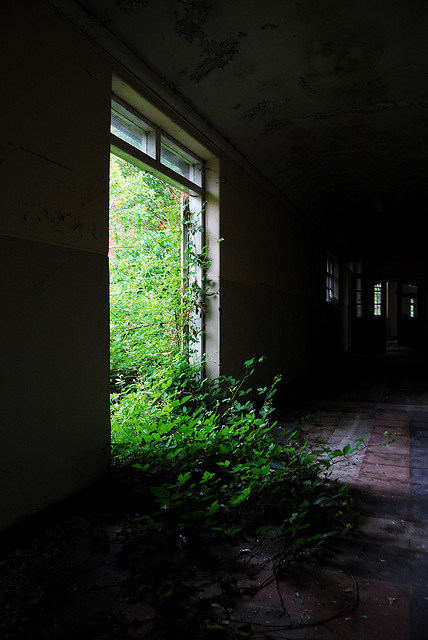“Why do you stay in prison when the door is wide open?” ~ Rumi
But I could give you so many answers to that question.
Because I like it inside.
Because I am terrified of stepping out.
Because this sadness is so large and intense, it climbs up and then hovers over me: like a gray cloud that will not depart even with the wind blowing.
You wake up without a reason to be born, preferring sleep. Drive around in your car, deliberating whether the windshield’s unwashed because the day’s engulfed in gray. You desperately want to be rid of the heaviness that gnaws at you, clutches at your heart and drags you down. Into a sinkhole.
You feel stuck. You brood. Grieve over the bits and pieces that are trying to break free. Mope over the strangeness that’s now calling for attention. And there are days when brooding and being stuck is what you want and so you don’t seek sunlight or the open. And the prison, the cloud, the grays are bosom buddies and so you stay in your thick haze, cocooned.
I did not want to write you a cliché.
I wanted to put it in black and white, my prison time stripped naked of flowery words, rainbows and sunshine. I would have. I began writing months ago. Except that the muses wouldn’t let me finish then. I kept having to rewrite, evolve tenses and recast pronouns, jump paragraphs, until I could hit on a worthwhile ending.
Because life refuses to leave you there—cocooned, wet, cold, holed up in your darkness.
Help comes. It does.
Someone sees you. You see yourself. A book falls. An angel calls. You see your children as though for the first time. And cliché, the mists recede, you break through, and bit by bit the light returns.
It fascinates me to no end that seeds germinate under a mantle of darkness. Or, that a child is born emerging from a pitch-black hole, through shooting pain, coated in goo. And it’s the same narrative every time: the raising of Lazarus; the resurrection; spring. Or that diamonds are created out of intense burning underneath the earth’s crust. And that the bulging worm inside the chrysalis needs to digest itself in its own soup before it can shoot wings.
But until you are stuck doing figure eights or find yourself six feet underground, cocooned for weeks and swimming in your own gunk, you won’t get it.
And so despite writhing in agony, I am writing you a cliché.
The process of transformation unfailingly begins with decay. Evolution is set in motion by a crisis. (In fact the word crisis comes from the Greek krisis or a decisive point.) First a fullness, and then a slip, then withering, a steep decline, followed by numbness, and the stripping of colors.
It is messy. It is dark. It is lonely.
But something happens in the isolating darkness. Seeds germinate, the diamond embarks on its alchemy, Lazarus lives, the worm remembers how to wear wings, and the heart beats for the first time. Because just when it gets so dark and you feel so dead, your eyes adjust, and the heart remembers a split second of joy. You see your children playing under a patch and it’s that ray of sun. And you will want to confront the suffocating prison, the gray cloud, and the starless pit.
And so it comes to pass.
You, you glorious being behind bars, numb or thinking yourself dead, unable to see through the mist, slogging through the gray, cocooned: life has not forgotten you.
The pit has a bottom. Help comes. The steep decline curves up.
And the door’s wide open when you are ready to see.
Love elephant and want to go steady?
Sign up for our (curated) daily and weekly newsletters!
Editor: Catherine Monkman
Photo: Rob Walker/Flickr, Roxanne Crouse/Pixoto












Read 0 comments and reply